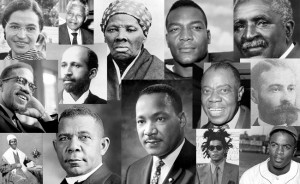
Used under Creative Commons License
Saydi Dowd, Staff Reporter
Black history is rich and vast; it does not simply belong to blacks but has universal significance. Whether it be in the sciences, in politics or in human rights, all of humanity has benefited from the contributions of African American communities. Nonetheless, these contributions, as extraordinary as they may be, remain unnoticed, both in our school’s curricula and in our daily lives.
Today, stereotypes and prejudices against blacks continue to be reinforced in the media. Therefore, Black History Month is an opportunity to counter this one-sided vision of our societies and offer an alternative vision that better reflects a reality where individuals of different origins see themselves represented and feel respected. Then, this celebration of difference becomes a celebration of belonging for us all, on equal footing, as members of the human race.
Black History Month was officially begun in 1976. However, it was Carter G. Woodson, a historian who started the Journal of Negro History, who, in 1926, came up with the idea of celebrating Negro History Week, beginning the second Sunday of February, the date closest to Abraham Lincoln and Frederick Douglass’ birthday. In 1969, black students at Kent State University proposed expanding the week to a month, and Kent State first celebrated Black History Month in February, 1970.
Mr. Woodson believed that African-Americans needed to understand their history and traditions to survive as a people, but understanding that history is important to all Americans, not just black Americans. Without that understanding, others cannot really know what it means to be an American.
Initially, it was meant to bring attention to the cultural accomplishments African Americans had contributed to American history. Woodson thought it would be good to have a time-honored, fixed date when people would find out as much about African American history and their legacies as possible.
Black History Month is not just a time for blacks; it is a time for our nation as a whole to reflect and see how far we have come. It is a powerful thing to look back and remember all the faces, both black and white, that impacted the Civil Rights Movement, fought prejudices and helped eradicate stereotypes. It is a time for people to recognize who has paved the road for African Americans today, and give them something to look forward to in the future.
It is still significant and relevant to recognize Black History Month because Black History is American History. Until most Americans regard it as such, though, they will need a month of formal recognition to learn from it, even if it is the shortest month of the year.